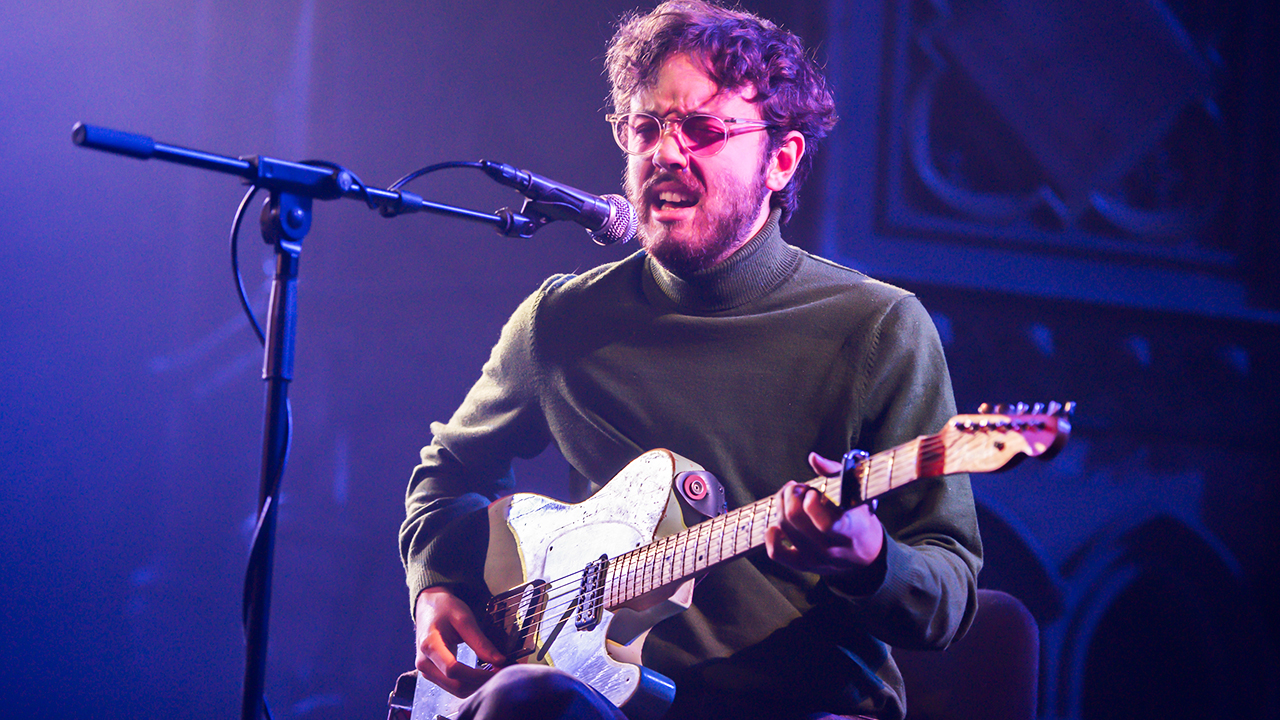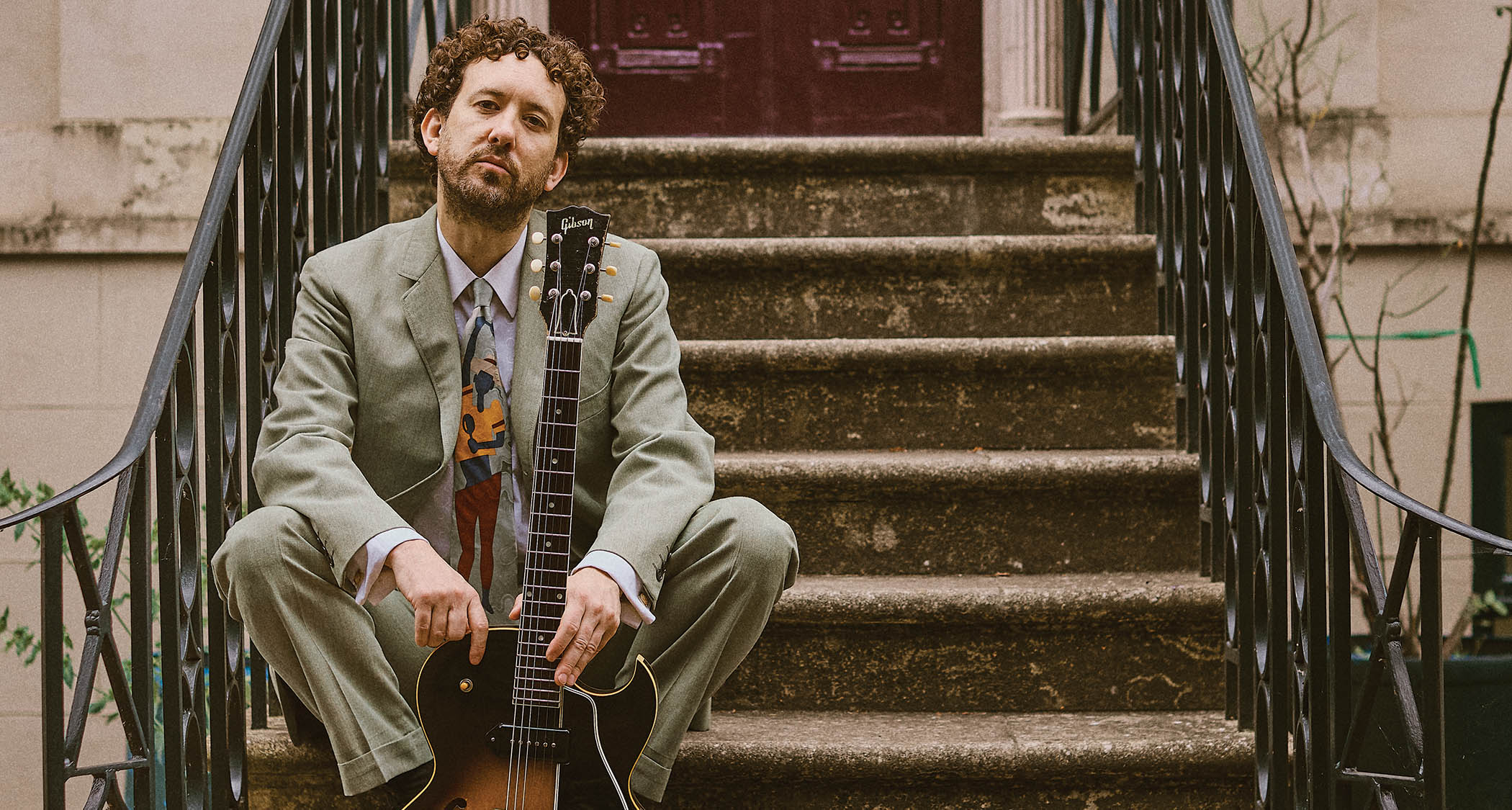“He’s written some of the heaviest, greatest rock riffs of all time. That’s served me tremendously”: How Harrison Whitford balances inspiration from Aerosmith guitarist dad Brad, boss Phoebe Bridgers and his devotion to alternate tunings
Determined to find his own sound and voice, the guitarist’s latest project Attention Bird Utopia fuses what he’s learned about being inside powerful songs, writing in alternate tunings and remembering to listen

Harrison Whitford isn’t chained to his dad Brad Whitford’s sound or aesthetic. Evidence of the younger musician’s distance from Aerosmith is clear in Best of Kings, the debut release by his latest project, Attention Bird Utopia.
“I’m looking for sounds which excite me,” Whitford says. “it’s somewhat subversive, and the means of getting there changes with every song.”
He continues: “I find it’s the responsibility of an artist to at least aspire to pull from as many sources as one can. So inspiration, for me, is about keeping your ears and eyes open to the fullest possible extent.”
Some of that approach could be attributed to Whitford’s time beside Phoebe Bridgers. “Playing with her taught me how it feels to situate oneself within great songs. If they’re truly great – as Phoebe’s are – they’ll tell you what needs to be there and what doesn’t. She’s a fantastic rhythm guitar player and I’ve always attempted to complement that.”
He confirms that his dad is an inspirational figure. “He instilled in me a strong work ethic when it came to practicing early on, and to have a strong grasp of the fretboard and the location of every note.”
He says of their musical divergence: “I don’t know how conscious or unconscious it was, but I’m sure it’s a mixture. I knew on some level that I wanted to carve my own path and have my own voice.”
What sort of player do you identify as?
All the latest guitar news, interviews, lessons, reviews, deals and more, direct to your inbox!
“I don’t know that I identify as any one kind of player – I’ve always felt nebulously between genres and styles. I plan on making more music and art, and hopefully getting to play on more records and songs that I love.”
What are the origins of Attention Bird Utopia?
“Eli Hirsch and I met on a project he was producing, that I’d been hired to play guitar on. I think we were drawn together by a shared love of songwriting – we began to help each other finish each other’s songs, and recording them was the natural next step.”
Do you have a shared philosophy on guitars?
“If we do, it’s that we’re both attracted to the attitude and sonic characteristics a guitar can provide to the landscape of a song. Tonally, we lean in the direction of drier, more direct-sounding guitars that feature some level of texture – which can often just be the result of overdriving a preamp.”
How about songwriting?
“I’d say we have complementary approaches. Eli has a strong grasp of songform and structure, and how to make something effective both formally and lyrically. I tend to fixate on the expressionistic quality of a song and lyric, finding the line between abstract and plain language. We both value clarity in songwriting – there shouldn’t be much to push past to experience the power of a great song.”
What type of gear tends to find itself into your hands?
“I gravitate towards instruments which produce an even and balanced tone. I like guitars to have body and clarity across the frequency spectrum.”

Which songs from Best of Kings came about first?
“The first one was Best of Kings itself, which Eli had started writing and shared with me. It already felt nearly fully-formed. We recorded it the same day that it was finished, and it’s one of my favorite captures on the album, particularly Eli’s vocal and the guitar tones.
“The electric guitar is one track throughout the song, and the solo sound is just a byproduct of riding the volume knob at that section while feeding into an overdriven tape machine preamp.”
Do you ever get into alternate tunings or weird gear?
I prefer a guitar plugged directly into an amp, or to grab an acoustic, than using effects for inspiration
“I often write and play in alternate tunings, primarily open D. I gravitate towards voicings that are more naturally at one’s disposal in open chord tunings. It’s so much easier to place a nine on a chord in the middle register and start accessing all the different chordal and melodic opportunities there.
“It’s a great method for breaking up your usual physical habits on the guitar and return to using your ears as guideposts – which is everything, after all.
“I tend not to gravitate towards weird gear as much. Perhaps I’ll pick up a different guitar or sit down at the piano if I’m feeling stuck. I’m not an outright purist, but I lean somewhere in the middle. I prefer a guitar plugged directly into an amp, or to grab an acoustic, than using effects for inspiration.”
How does your tone preference affect your gear choices?
“I like tones which are either very dry and direct, or distant and obscured. I like the sound of an electric guitar amp with some distance on a mic, or a blend of that and a more direct signal. In sessions, tones which obscure the attack of the instrument can be quite useful.”
Are you precious about gear and the songs that you create?
“I’m not precious about gear, really. I’m precious about the instruments I own that I cherish – but any instrument is usable in most circumstances. I try to approach everything from the perspective of what will serve the song.
“I try not to be precious about songs either. If there’s anything I get truly precious about, it’s more often performances.”
How much of an inspiration is your dad, Brad Whitford?
“The aspects of his playing that inspire me most are his sense of rhythm, his use of vibrato, and the emotion in his playing – all of which are uniquely his own. I think he’s written some of the heaviest, greatest rock riffs of all time, and laid down some of the most inspired and creatively fortified leads. That’s served me tremendously.
“When I was beginning to write and record my own songs, he was a helpful listener and a strong advocate for performance when it came to a recording – the fluidity of a performance is paramount.”
- Best of Kings is on sale now.
Andrew Daly is an iced-coffee-addicted, oddball Telecaster-playing, alfredo pasta-loving journalist from Long Island, NY, who, in addition to being a contributing writer for Guitar World, scribes for Bass Player, Guitar Player, Guitarist, and MusicRadar. Andrew has interviewed favorites like Ace Frehley, Johnny Marr, Vito Bratta, Bruce Kulick, Joe Perry, Brad Whitford, Tom Morello, Rich Robinson, and Paul Stanley, while his all-time favorite (rhythm player), Keith Richards, continues to elude him.
You must confirm your public display name before commenting
Please logout and then login again, you will then be prompted to enter your display name.



